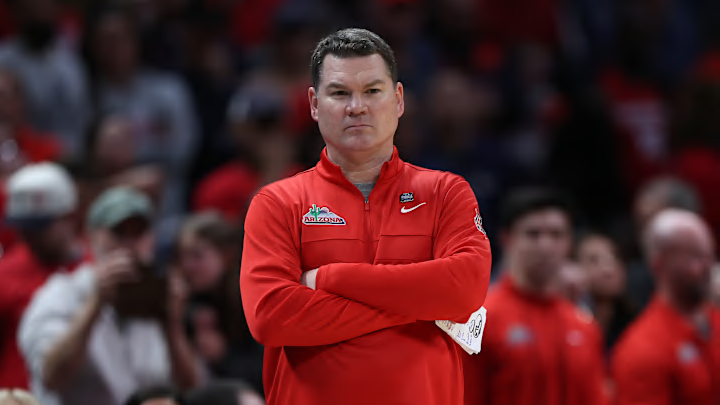Tommy Lloyd
In his initial three seasons as the head coach, Lloyd has already made a significant mark. With an impressive overall record of 88-20, Lloyd has guided the Wildcats to two Pac-12 regular-season titles, two Pac-12 Tournament titles, and three NCAA Tournament appearances including two Sweet 16 appearances. His early success signifies his ability to adapt quickly and build a competitive team. Despite falling short in the 2024 NCAA Tournament Sweet 16 against the Clemson Tigers, Lloyd's coaching prowess should not be solely blamed. Players, in their post-game interviews, defended Lloyd and shouldered the responsibility for the defeat.
Arizona players with a strong show of support for Tommy Lloyd.
— Matt Reynoldson (@Matt_Reynoldson) March 29, 2024
Oumar Ballo: "I don't think (those blaming him) are true Arizona fans."
Caleb Love: "It wasn't on him. He put us in position; he's not out there playing on the court."
Kylan Boswell: "For me, he means everything." pic.twitter.com/I3mkoJVUln
In 2022, Lloyd won the AP Coach of the Year, Pac-12 Coach of the Year, National Association of Basketball Coaches Coach of the Year, and US Basketball Writers Association Coach of the Year awards.
Lloyd has four four-star commits from his 2024 recruiting efforts: Carter Bryant, Jamari Phillips, Emmanuel Stephen, and Joson Sanon (committed, not yet signed). Lloyd also coached Bennedict Mathurin who is doing very well in the NBA. The future is bright for Lloyd and Arizona Basketball.
Sean Miller
Sean Miller's 12-season tenure as head coach showcased his ability to maintain consistency and compete at a high level. In his first three seasons, Miller amassed a solid overall record of 69-35. He secured a Pac-10 title, one NCAA tournament bid, and an Elite Eight appearance. Miller also won Pac-12 Coach of the year in 2011 (he went on to win it two more times in 2014 and 2017). Miller's emphasis on defensive tenacity and disciplined play became hallmarks of the Arizona program during his tenure.
Throughout his time, the Wildcats won 52 consecutive non-conference home games. His overall record at Arizona was 306-106 and he developed 12 NBA draftees including a few who were lottery picks.
Lute Olson
The legendary coach Lute Olson holds a special place in the history of Arizona Men's Basketball. In his first three seasons at the helm, Olson compiled a record of 52-36. His leadership and strategic acumen led the Wildcats to a Pac-10 title and two NCAA tournament appearances. This was just the beginning of the success that would unfold under Olson's guidance in the subsequent years.
Olson went 589-187 (.759) in his 25 years at Arizona and was voted Pac-10 Coach of the Year seven times with his first one awarded in 1986 — year four of his career in Tucson ('88, '89, '93, '94, '98, and 2003). Olson also led Arizona to 20 consecutive 20-win seasons and is one of only five coaches in NCAA history to have achieved 29 or more 20-win seasons.
But most importantly, Olson's 1996-97 team won the 1997 NCAA Championship. It was a Cinderella story where Arizona was the only school to defeat three No. 1 seeds in the tournament, upsetting overall number one seed Kansas. Under Olson, Arizona won two Final Fours since the 64-team tournament's start in 1985.
A note about the inherited situations
It should be noted that Olson started the build of the program to what it is today, he inherited a team that had recently endured its worst season in school history, winning only four games overall and one in Pac-10 play.
Miller built upon Arizona's legacy. Within three months of joining the program, Miller had a recruiting class ranked 12th in the country. Miller led Arizona to a 16-15 record (10-8 in the Pac-10) in his first season, but the Wildcats missed the postseason for the first time in 25 years.
Lloyd was the fortunate coach, inheriting a strong team that came with frustrated fans who wanted a team that could get past the Elite Eight. Lloyd made history by being the first in Division I history to win his opening five games, defeat an AP top-5 team in Michigan (ranked No. 4 at the time), and win by an average of thirty points per game.
